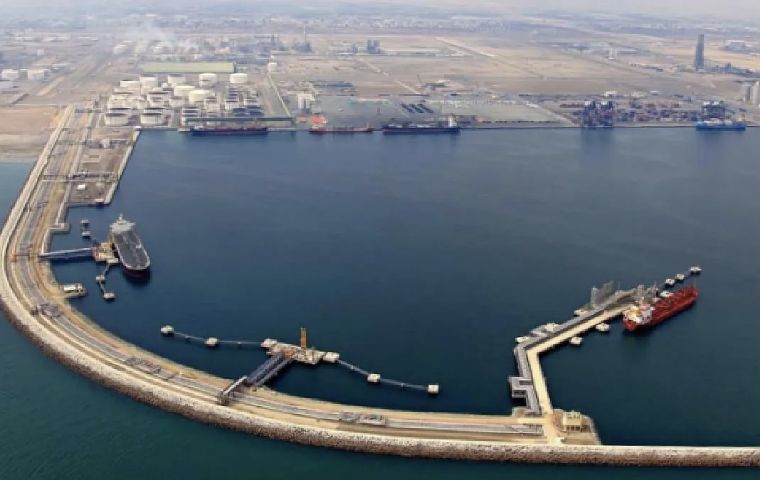MercoPress. South Atlantic News Agency
YPF announces mega port on Rio Negro's Atlantic shores
 The structure will hopefully be operational starting in 2025
The structure will hopefully be operational starting in 2025 Argentina's state-run oil company YPF announced a mega port will be built in Río Negro to export oil from the Atlantic shore.
The project foresees a pipeline from Vaca Muerta to Sierra Grande and 20 reserve tanks together with a mega maritime terminal to sell crude abroad and substitute imports.
YPF is planning a pipeline between Vaca Muerta and the port Punta Colorada de Sierra Grande, in the province of Río Negro, where it will deploy a mega maritime terminal that will become the largest oil exporting port in the country, with a total investment of US$ 1.260 billion, YPF CEO Pablo González announced after meeting with provincial lawmakers, who fine-tuned local legislation with this project in sight last week.
The project will connect the existing oil exploitation in the Neuquén formation of Vaca Muerta with the port of Punta Colorada, in Río Negro, using a pipeline, for the shipment of the production using offshore monobuoys located 6.7 kilometers from the coast, according to the developers.
The pipeline is expected to carry 60,000 cubic meters (372,000 barrels of crude oil) per day through a 700-kilometer line. The new line should exceed the capacity currently available through the Oleoductos del Valle (Oldelval) system, which links Vaca Muerta to Puerto Rosales in Bahía Blanca (36,000 cubic meters/day).
The plan is also expected to create some 1,000 direct jobs and another 3,000 indirect ones. It is expected to be operational by 2025.
The project also contemplates the construction of 20 reserve tanks on an area of 250 coastal hectares, with a storage capacity of 1 million cubic meters, equivalent to 6.2 million barrels.
“The maritime station will be the largest crude oil exporting port in Argentina” and stressed that the project “does not interfere in any way with the green hydrogen project,” González explained.
Río Negro law had banned oil and gas prospecting, exploration, and extraction in the San Matías Gulf since 1995. It also restricted the installation of oil, gas, and other pipelines for the transportation of hydrocarbons and their derivatives and the construction of terminals for the loading and unloading of vessels transporting these products.
González insisted that “the current transportation capacity, both to the port of Rosales in Bahía Blanca and to the domestic market, is at the limit of its possibilities.”
He added that “it is essential to look for new alternatives for exports, complementary to the start-up, scheduled for next year, of the trans-Andean pipeline after two decades of paralysis.”
Therefore, “it was determined that Punta Colorada offers the best conditions for this purpose due to the depth of the coastal waters that allow the operation of deep draft vessels, as well as the availability of land for the installation of complementary plants.”
(Source: Ámbito)




Top Comments
Disclaimer & comment rulesCommenting for this story is now closed.
If you have a Facebook account, become a fan and comment on our Facebook Page!